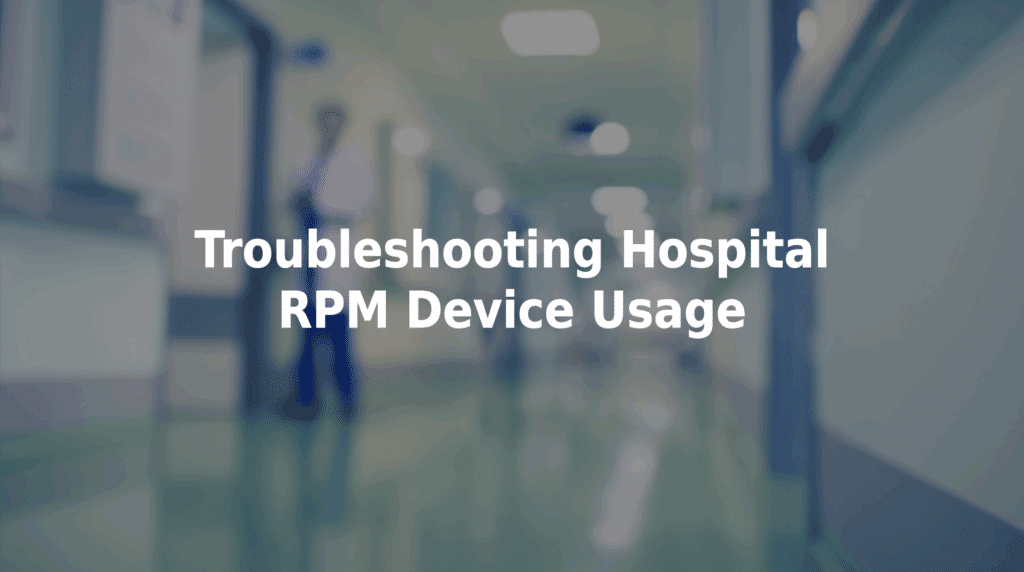Troubleshooting Hospital RPM Device Usage
As hospitals expand their use of remote patient monitoring (RPM) to reduce readmissions and extend care beyond discharge, administrators are increasingly focused on troubleshooting hospital RPM device usage. Even the best technology can fall short without clear workflows for addressing setup issues, patient errors, or connectivity problems. TriageLogic’s RPM program includes full clinical support and device management to help hospitals proactively prevent and resolve these challenges — ensuring successful implementation and continuous patient monitoring.
Why Device Issues Can Undermine RPM Effectiveness
When RPM devices fail to function properly or go unused by patients, hospitals risk losing the key benefits of the program: real-time insights, early interventions, and improved outcomes.
Common device-related problems include:
- Failed initial setup or pairing.
- Inconsistent data transmission.
- Low patient adherence due to confusion or discomfort.
- Battery and charging issues.
- Alert fatigue from inaccurate readings.
These problems can overwhelm staff, delay care decisions, and reduce confidence in the program — unless there’s a structured plan for addressing them.
Common RPM Device Issues and How to Resolve Them
1. Device Pairing or Setup Failure
Patients may struggle to activate or connect devices during the onboarding process.
Solution:
Use a standardized onboarding protocol that includes live support, visual guides, and verification of successful pairing before discharge. TriageLogic provides guided setup and patient education materials to improve first-time success rates.
2. Data Transmission Delays or Failures
Bluetooth or Wi-Fi-enabled devices can lose connectivity, resulting in gaps in monitoring data.
Solution:
Ensure patients have reliable internet access and clearly understand how devices connect. Set automated alerts when devices go offline for extended periods. TriageLogic monitors data integrity and flags missing readings for follow-up.
3. Battery and Charging Issues
Devices may stop transmitting due to battery depletion or improper charging practices.
Solution:
Educate patients on proper charging routines and provide troubleshooting tips if devices stop functioning. Offer scheduled check-in calls to verify device functionality.
4. Inaccurate or Inconsistent Readings
Poor sensor placement or user error can result in false alerts or missed abnormalities.
Solution:
Provide ongoing education with real-world examples and coaching from nurse triage staff. TriageLogic’s nurses review questionable data before escalating it to avoid unnecessary interventions.
5. Patient Nonadherence
Patients may forget to use devices or become discouraged if they don’t understand the value.
Solution:
Use a proactive communication strategy with reminders, encouragement, and feedback loops. TriageLogic includes live outreach to patients who miss readings and reinforces adherence through daily check-ins.
Workflow Tips for RPM Device Troubleshooting
To reduce downtime and maintain data quality:
- Assign RPM coordinators to track device performance and follow up with patients.
- Create internal escalation paths for unresolved technical issues.
- Use automated reports to detect trends like missed readings or battery failures.
- Maintain spare devices to quickly replace faulty units.
- Document troubleshooting steps for staff reference and consistency.
TriageLogic includes full support for device tracking, patient outreach, and technical escalation to reduce the burden on in-house teams.
How TriageLogic Simplifies Device Management for Hospitals
With TriageLogic, hospital administrators don’t have to troubleshoot RPM device issues alone. Our program includes:
- Comprehensive onboarding and training materials for patients.
- 24/7 support from nurse triage teams to verify symptoms and readings.
- Device monitoring dashboards to flag missing or delayed data.
- Alerts for connectivity failures or missed readings.
- Dedicated support staff to coordinate logistics, returns, and replacements.
We help hospitals maintain reliable, HIPAA-compliant RPM data that supports timely care and performance improvement.
Keep Your RPM Devices Running — And Your Patients Monitored
Device issues are inevitable — but they don’t have to derail your hospital’s RPM program. TriageLogic’s comprehensive support ensures that equipment, patients, and staff stay connected and engaged, so your hospital can deliver the best possible care.
Contact us today to learn more about a program and maintain successful monitoring programs at scale.

